Mentoring for Translators and Interpreters
SURVEY RESULTS - Analysis of the answers
PART II: MENTOR
Future or Continuing Mentoring (Mentor)
This section targeted all those who had already acted as a mentor (continuing the survey afterQuestion 14) or willing to do so in the future (having answered Question 6 positively). We counted 149 participants in the first group and 186 in the second one. However, the questions below were answered by fewer people. Indeed, only 273 persons answered Question 15 and the following questions up to Question 21, indicating that 62 relevant respondents skipped this section of the survey.
Question 15: In order for you to become (or continue being) a mentor, which of the following should apply?
(multiple choices)
42% of the respondents to this question were willing to become (or continue being) a mentor, if asked to do so (114). 102 respondents (37%) would like to be supported by other mentors, closely followed by 100 respondents seeking recognition for their efforts. While 92 respondents (34%) stated that they would like to get paid or get some other kind of benefit, 91 wished for a program and standard to follow, in order to take on the role of (or continue being) a mentor, closely followed by 89 respondents, wishing to be part of a controlled mentoring program. A significantly lower number (54) wanted to have a legally binding confidentiality agreement with the mentee, while more than a fifth (62) of the respondents would like to mentor only on linguistic matters, only 14 respondents wish to do so exclusively on business matters.
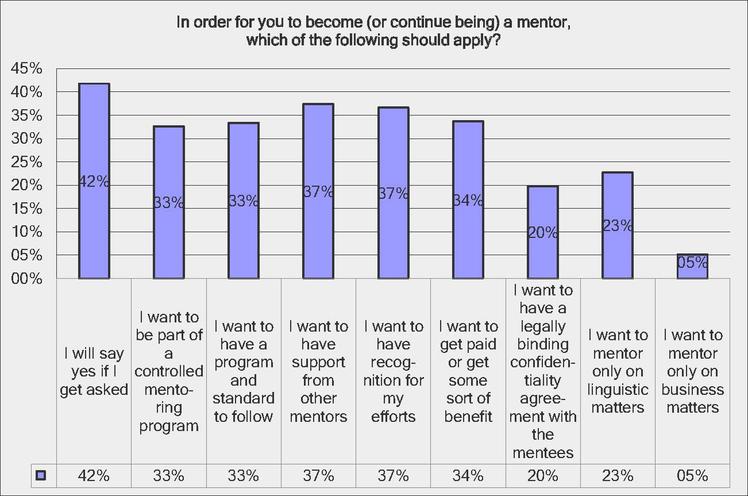
Question 16: Regarding future mentees, which of the following are important prerequisites for you?
(multiple choices)
Out of a total of 273 respondents to this question, 110 (40%) will only work with mentees in the same language combination, closely followed by a group of respondents (109) choosing to work only with mentees wanting to specialize in their areas of expertise. 92 respondents (34%) would opt for a mentee from a pool of candidates and a few less (86) expressed their wish to mentor someone they already know, or who has been referred to them by a person of confidence. Almost a third (80) wanted to be chosen by the mentee over other mentors. At the lower end of the spectrum, a still significant number (64) of people will work with mentees from existing, controlled programs or would wish for the mentee to already have been working as a freelancer for at least 1 year (61 equalling 22%).
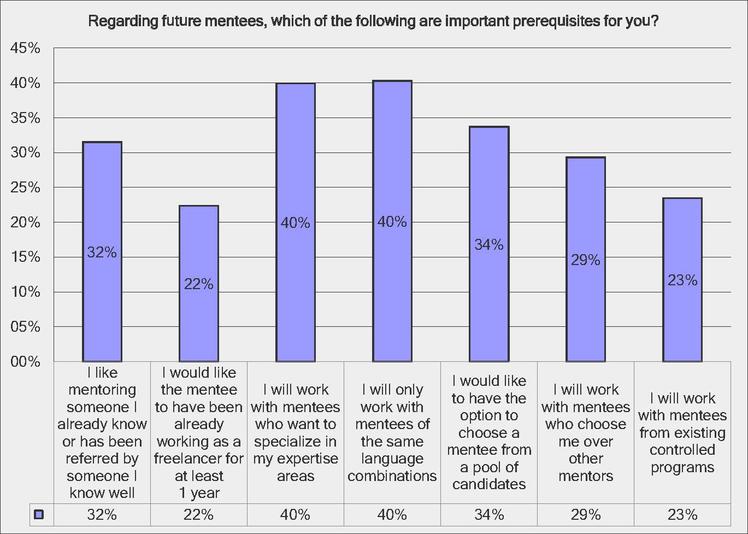
Question 17: Do you think that being paid an hourly rate as a trainer would help you give more mentoring hours to your mentees?
An overwhelming majority (188) of participants answered this question positively, whereas almost one third (85) did not share this view.
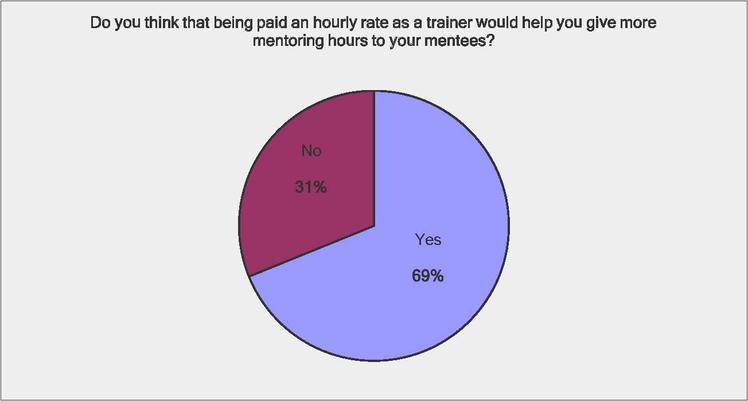
Question 18: Regarding giving your mentoring services for free versus being paid as a trainer, which of the following statements represent your position?
Almost 40% (93) would happily take on the role of mentor if a sponsor, e.g. a translation agency, university or governmental institution paid them for their time and effort. Nearly a third (80) would be happy to help others for free, whereas almost a fifth (46) would like to mentor for free in exchange for some non-monetary tangible benefits, e.g. having the mentee do the first draft of their projects. Potential mentors, wanting to be paid by the mentee for their professional service, are in the minority (31 equalling 13%).
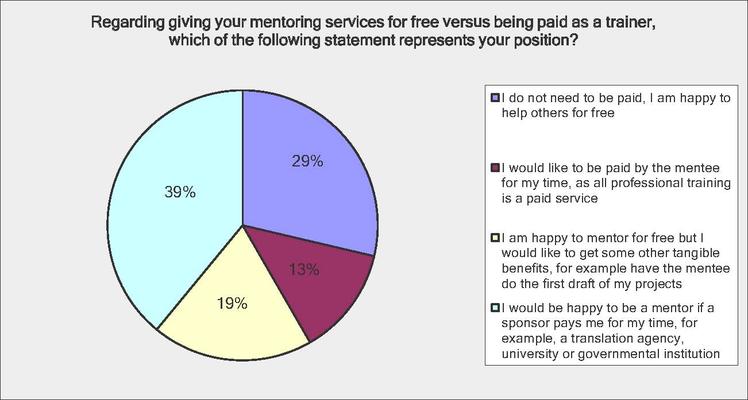
Question 19: Which methods of mentoring are you happy to be part of?
(multiple choices)
An overwhelming majority of 76% (207 respondents) chose local, face-to-face meetings and speaking on the phone as their preferred mentoring methods. Nevertheless, a high number of respondents (188 equalling almost 69 %) would also accept remote or Skype meetings and exchange by e-mail. A significantly lower percentage of 14% (37 respondents) voted for e-mails only. A still lower number (19) that chose shadowing on interpreting assignments only, is consistent with the overall low number of freelance and in-house interpreters participating in this survey. We do not have specific data about other mentoring methods that 22 respondents declared they wanted to be part of.
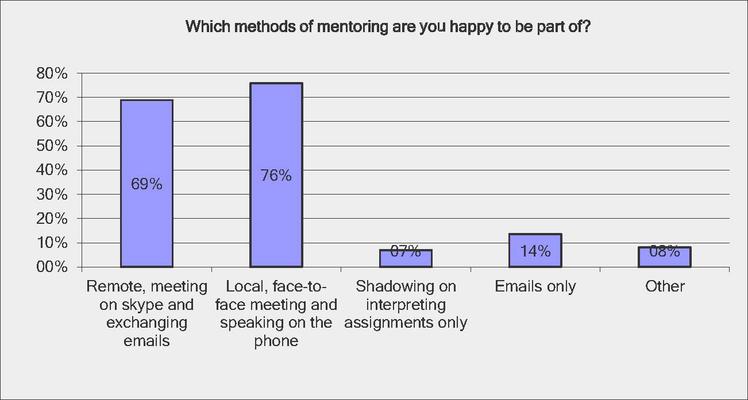
Question 20: What is the ideal length of a mentoring period?
The biggest group of respondents to this question (94 equalling 34%) would like to see the mentoring period as an on-going relationship that would finish as soon as both parties felt it’s time. A little more than a fifth (58) wanted its duration to depend on the mentee, 46respondents (17%) thought it should at least last 6 months, closely followed by 43 persons who set the minimum at 2-3 months. At the very end of the list only 32 (12%) considered around one year as the ideal length of a mentoring period.
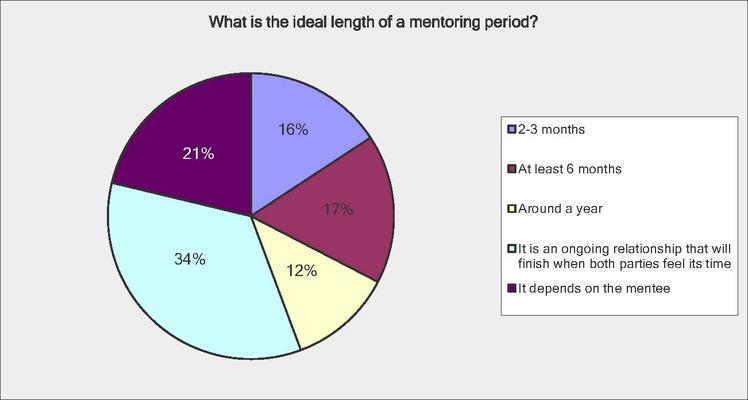
Question 21: Would you consider a probation period a helpful stage?
A whopping majority of 201 respondents believed a probation period to be helpful, whereas72 (26%) did not share this view.
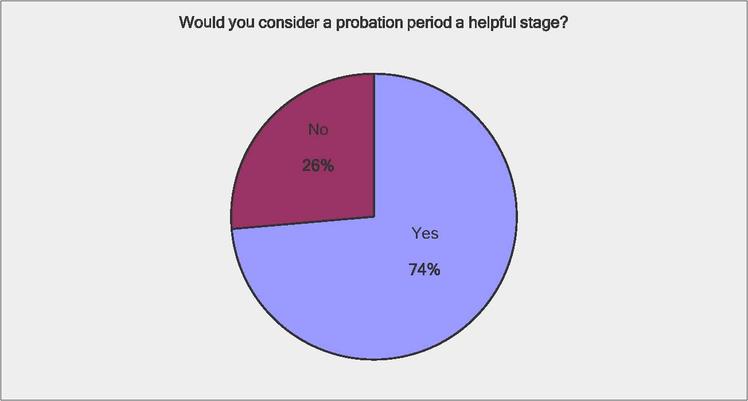
Question 22: How long should it be?
A clear majority of 117 respondents out of 200 think that the probation period should last 1‑2 initial meetings, while 83 would rather make it at least 1-2 months.
1 person skipped this question after having answered the previous one positively.
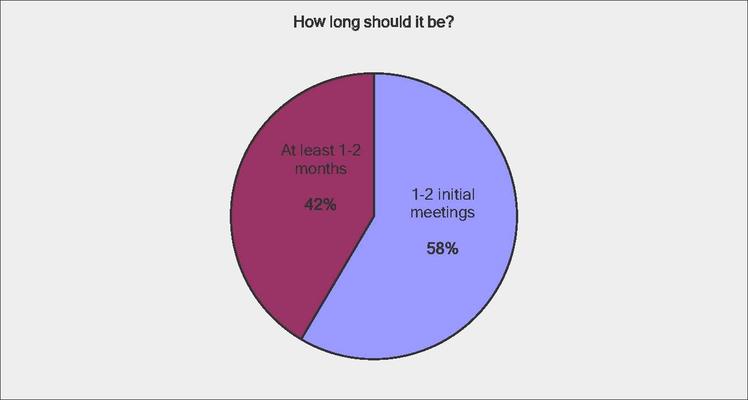
Out of the 273 person who started to answer the questions in this section on future or continuing mentoring, 20 did not answer the 7 remaining questions in this section.
Question 23: If one day you accept to be a mentor, would you rather:
A slight majority of 132 respondents out of 253 would supervise either a student or colleague, whereas more than a quarter (65) would rather supervise a new graduate. At the lower end of the list of chosen answers, 29 respondents preferred to supervise a student, closely followed by the smallest group of 27 respondents (11%) who are inclined to rather supervise a colleague who wants to get new skills.
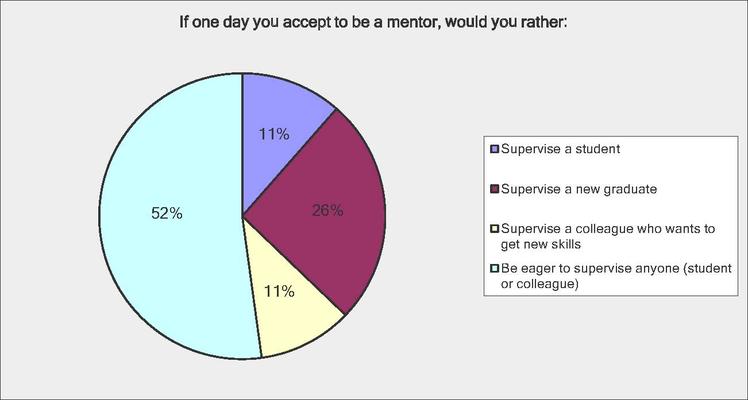
Question 24: As a mentor would you rather deal with mentees:
Here, a majority of 151 potential mentors prefer the mentee to have the same language combination as them, almost a third (76) would rather deal with mentees interested in specializing in the same area as them, whereas a minority of 26 (10%) prefer mentees specializing in different areas or languages than theirs.
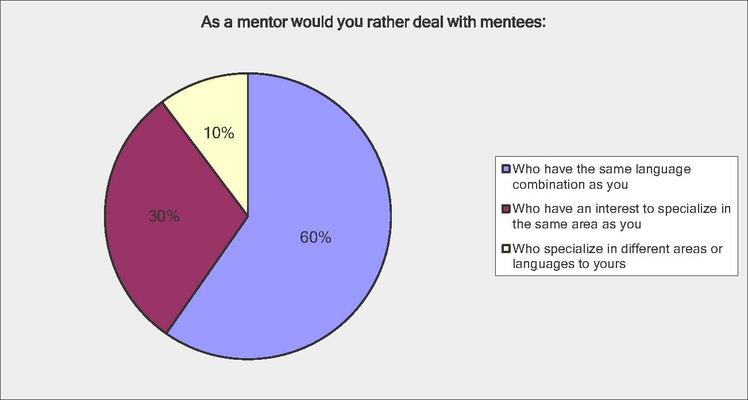
Question 25. In which of the following areas would you be willing to be a mentor?
(multiple choices)
A vast majority of 60% (152 out of a total of 253 respondents) is willing to mentor on translation and interpreting specific questions only. The number of respondents choosing to mentor on proofreading and quality control (116 equalling 46%), and those willing to mentor on research techniques, references and resources (113), almost balance each other out. With 94positive answers, mentoring on other translation-related tasks also ranks high on the list, closely followed by 90 respondents (36%) willing to support mentees in building their own business, invoicing, marketing, etc. Almost a third (81 respondents) wants to mentor on client and agency communication, followed by 73 respondents wanting to mentor on project and workflow management. 70 potential mentors stated their willingness to mentor on CAT tools, whereas significantly fewer respondents (39 equalling 15%) want to support mentees with translation portals, support groups and associations, followed by 36 answers for website and software localization. The low number of respondents (30) wanting to mentor exclusively on interpreting appears to be consistent with the relatively low number of interpreters participating in the survey. Almost 10% (25 respondents) expressed their willingness to mentor in all listed fields.
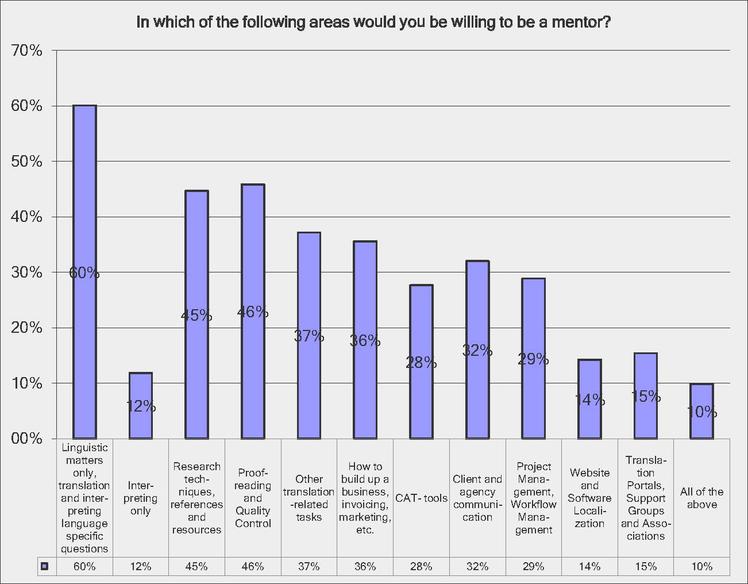
Question 26: If you would like to be a mentor but don’t have enough time, which of the following may help while mentoring?
(multiple choices)
116 respondents (46%) stated that getting paid in order to be able to decline work would help them be a mentor in spite of time restrictions, followed by the second biggest group of101 respondents (40%) wishing for a second mentor as a back-up. Almost 30% (75 respondents) would have the mentee do some of their work, so they could mentor on the job. Again, potential mentors who chose mentoring on interpreting by shadowing interpreting assignments are in the minority (23).
This question offered the possibility to explain other ways to be helped while mentoring. People having chosen this option (19) mentioned reasons like:
- Get support through a mentoring program (1)
- Be able to implement a coaching method (1)
- Make sure that the mentor is not wasting his/her time (1)
- Mentor after working hours or during free time (week-end, evening, holidays, etc.) (2)
- Limit mentoring time (one contact per day or even once or twice per week) (2)
- Be sure that the mentee is flexible regarding coaching-time (2)
- 5 respondents also underlined that when mentoring, one should make time for it – those who do not have time should simply not mentor
- 5 answers were not exploitable.
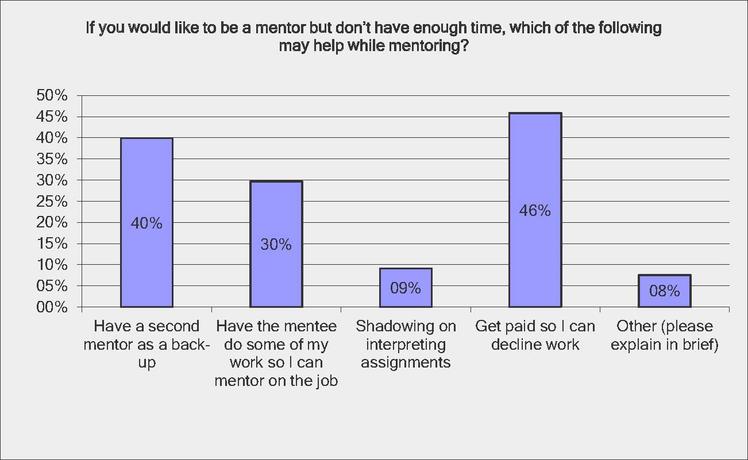
Question 27: How much time could you dedicate per week as a mentor?
A majority of 141 respondents (56%) would dedicate between 2-5 hours per week to mentoring activities, followed by the second largest group of 83 respondents (33%), able to allocate 1 hour per week. Only 8% (22 respondents) could allocate more than 5 hours a week. In consistence with the low numbers of interpreters participating in the survey, only 7 respondents chose the answer “At least one interpreting assignment a month”.
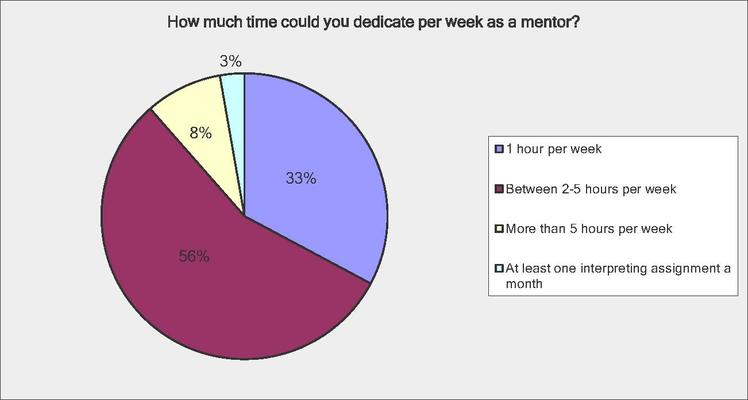
Question 28: What do you find to be the most difficult aspect of being a mentor?
83 respondents think that finding the necessary time is the most difficult aspect of being a mentor. A little more than a fifth (55) think that it is difficult to evaluate the mentee’s needs, followed by 50 persons who do not think it is difficult to be a mentor. To 35 respondents, confidence in their own skills as mentors turns out to be the most challenging aspect of mentoring, while striking a good relationship with the mentee ranks at the very low-end of the list with 30 respondents equalling 12%.
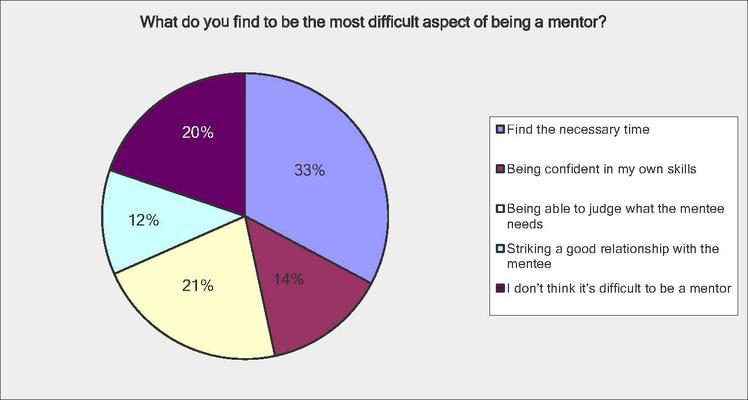
Question 29: What would you like to have as a mentor that has not been covered in this questionnaire?
(open question)
50 participants answered this question, but 15 indicated that they could not think about anything else that had not been covered in Part II of the survey. We regrouped the others’ ideas in the following list, where they either explained what they would like to have or what should be taken into consideration when mentoring:
- More work (1)
- One mentee to one mentor (2)
- Being allowed to take part in mentoring (1)
- More time (1)
- The option to choose the mentee from a pool of mentees (2)
- The personal ability and skills to mentor well (2)
- A mentoring program with clear goals, expectations and commitments (2)
- The possibility to screen the mentee (1)
- A network to support mentors (institutional and professional associations, other mentors plus events, trainings, workshops, lectures, forums) (10)
- Trust (1)
- The possibility to mention the mentoring experience on their CV (1)
- An agreement with the mentee in order to narrow down what to improve on (2)
- Making sure the request for mentorship was realistic (1)
- The importance of the ethical aspects (1)
- Differentiating between mentoring officially employed colleagues and mentoring freelancers (1)
- Making sure that mentoring remained free (1)
- Mentoring via social media (1)
PART III: MENTEE >
(< Back to Part 2: Mentor - Past Experience)
